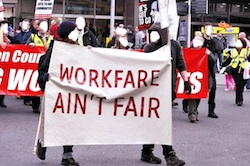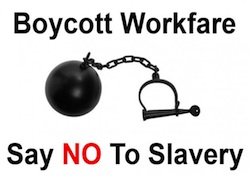ERNIE JACQUES looks at the implications of a recent appeal court ruling on the case of two jobseekers denied benefits for refusing unpaid work.
The governments’ latest workfare scheme appeared to suffer a significant (though not fatal) blow in February when the court of appeal ruled that forcing two unemployed jobseekers to undertake unpaid work was legally flawed.
Cait Reilly, a university graduate and volunteer museum worker, and unemployed HGV driver Jamie Wilson both claimed that being forced to work without pay was slave labour and a denial of their human rights. Reilly was required to stack shelves in a Poundland store, whereas Wilson was one of a growing band of refusenicks who declined the offer of 30 hours’ work experience without pay. For refusing unpaid, low grade work, he lost his entitlement to jobseekers’ allowance for six months.
In its adjudication, the appeal court rejected both appellants’ claims that working for benefit was a breach of their human rights. One of the judges said that “characterising such a scheme as involving or being analogous to ‘slavery’ or ‘forced labour’ seems to me to be a long way from contemporary thinking”.
These are not the statements of someone who has much comprehension or compassion for the unemployed, the poor and those who have to live on jobseekers’ allowance. It now seems to be deemed unreasonable and selfish to expect to be paid the minimum wage, or to reject an offer of unsuitable and low-grade work.
There are many thousands of jobseekers, including young people, who would jump at the chance of work experience if it offered high-quality training, a permanent job, and some career progression at the end of it. But for the vast majority of unemployed people that set of choices and opportunities is not on offer.
Of course, mandatory work experience programmes are nothing new. For 30 years now, government work programmes have amounted to empty promises and political spin, punishing tens of thousands of jobseekers for the failings of an economy and jobs market that is not of their making. Experience tells us that many soon become disappointed, disillusioned and cynical about their personal circumstances and a system of politics that appears to have no relevance to their hopes, aspirations and prospects.
Powers exceeded
However, the appeal court did find that work and pensions minister Iain Duncan-Smith had exceeded his delegated powers in that the Department for Work and Pensions programme was not fully in compliance with the Act of Parliament sanctioning such schemes. The court stated that its ruling would have immediate effect, and the law firm acting for Reilly and Wilson pointed out that “tens of thousands of people stripped of their benefits must now be entitled to reimbursement by the DWP”.
The court awarded full costs to the appellants and refused the DWP leave to appeal, yet the DWP said it will now go to the supreme court.
Speaking on the Andrew Marr show on Sunday 17 February, Duncan-Smith said: “Most young people love this programme and I am sorry but there are a group of people out there who think they are too good for this kind of stuff.” He referred to former Tesco chief executive Sir Terry Leahy as someone who began his career stacking shelves, as though his story was somehow typical.
Sadly, the career options open to a typical shelf-filler are usually characterised by low pay, part-time work, temporary and zero-hour contracts where the opportunities for promotion are severely limited. For most, poverty knocks, and unemployment is a very real experience.
Reilly is a geology graduate, but Duncan-Smith branded her a “job snob”, saying: “The next time these smart people, who say there’s something wrong with this, go into their supermarket, [they should] ask themselves this simple question: when they can’t find the food on the shelves, who is more important to them, the geologist or the person who’s stacked the shelves?”
Duncan-Smith seems to be saying that stacking shelves in a supermarket is an important job. If that really is the case he might want to join those who are campaigning, not just for the national minimum wage, but for a living wage for such workers. Don’t hold your breath.
Duncan-Smith went on to dismiss the court ruling as “rubbish”, saying, “I have already put down emergency regulations. That has ended it.”
But that cannot be the end of it, for one of the guiding principles of British justice is that people cannot be treated differently under law. If Cait Reilly and James Wilson are entitled to have their lost benefits repaid, so too are thousands of other people who have been denied payments under similar circumstances.
Safety net
Perhaps Duncan-Smith should also be reminded that jobseekers’ allowance is not a means-tested benefit but an insurance policy. People pay national insurance so that when they are unemployed they have a basic income, on the proviso that they are actively seeking work. Of course, that begs the question of how they can actively seek work when they are working unpaid for 30 hours or more for some retailer, charity or multinational company.
Successive governments and many right-of-centre politicians, journalists, economists and establishment figures have redefined unemployment pay as a benefit. For most working people and jobseekers it is still what it was always intended to be – an insurance, or a safety net, when they fall on hard times. Its redefinition as a benefit has enabled politicians to label jobseekers and the unemployed as ‘shirkers’, as part of the problem, the reason for the UK’s economic, social and moral demise, and for its mounting debt.
All too often, unemployed people are described as people who lay in bed with the blinds closed while hard-working members of society join the morning rush hour, earn money and pay taxes to fund the good life for the shirkers. This is the image regularly portrayed by newspapers such as the Daily Mail, the Express, the Telegraph and the Sun.
But the reality is somewhat different. No doubt there are unemployed people who play the system (just as there are some politicians, captains of industry, bankers, and directors of multinational companies who do), but most job seekers desperately want a proper job and a living wage.
After listening to Duncan-Smith I was reminded of a folk song written by factory workers in the1890s which sums up the lot of many people who find themselves at the bottom of the labour market ladder.
Poverty Knock
Up every morning at five,
It’s a wonder that we’re still alive.
Tired and yawning in the cold morning,
It’s back to the dreary old drive.Oh dear, we’re going to be late,
Gaffer is stood at the gate.
We’re out of pocket, our wages he’ll dock it;
We’ll have to buy grub on the slate.Poverty, poverty, knock, my loom is a-saying all day.
Poverty, poverty, knock, gaffer’s too skinny to pay.
Poverty, poverty, knock, keeping one eye on the clock.
I know I can guttle, when I hear my shuttle,
Go poverty, poverty, knock.And when our wages he’ll bring,
We’re often short of a string.
While we are fratchin’, with gaffer for snatchin’,
We know to his brass he will cling.We’ve got to wet our own yarn,
By dipping it into the tarn.
It’s wet and soggy and makes us feel groggy,
And there’s mice in that dirty old barn.(Chorus)
Sometimes a shuttle flies out,
And gives some poor woman a clout.
There she lies bleeding, but nobody’s heeding,
Who’s going to carry her out.Oh dear, my poor head sings,
I should have woven three strings,
But threads they are breaking, and my back is aching.
Oh how I wish I had wings.(Chorus)
—-
See also: Make the Living Wage Compulsory



18 March 2013
[…] also: Poverty Knocks Tags: Con Dems, Employment, Policy, The Labour […]